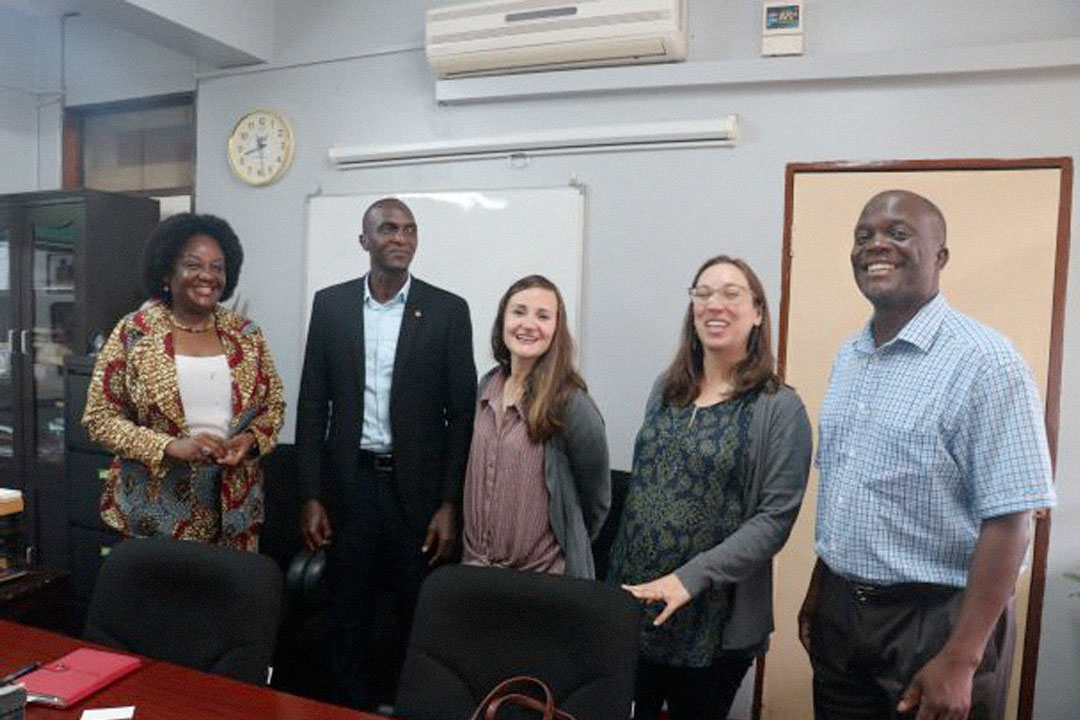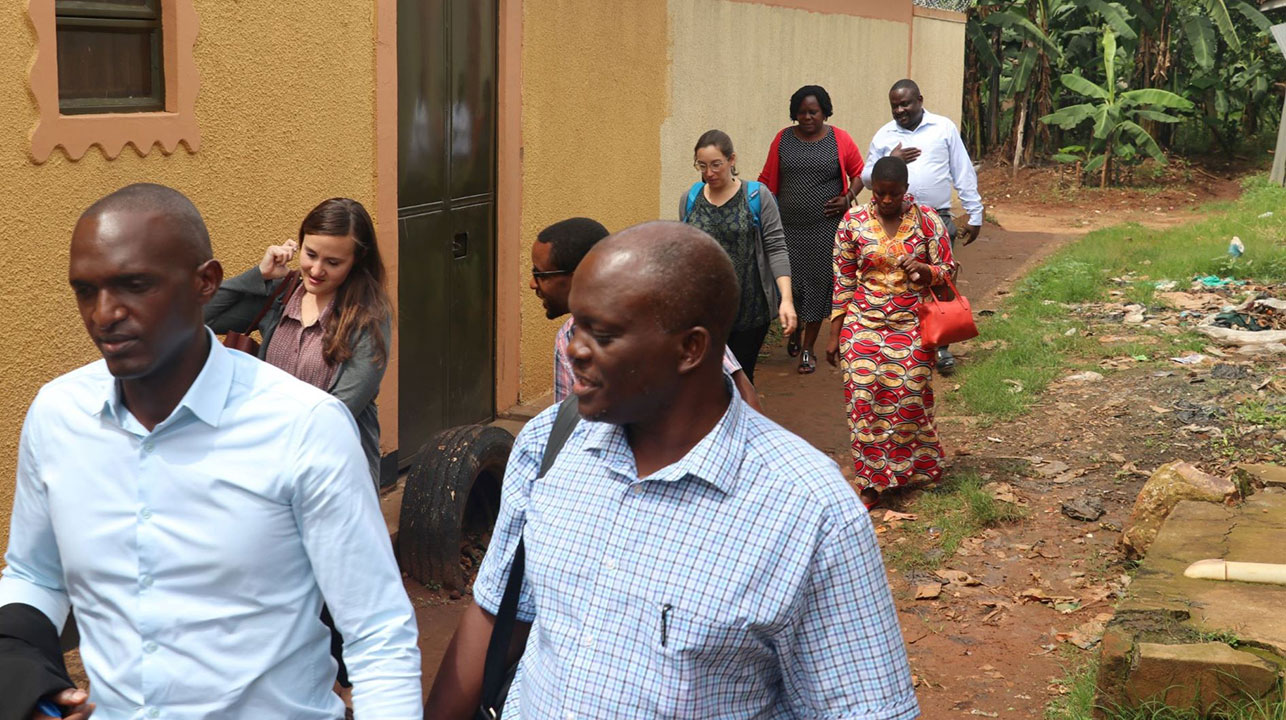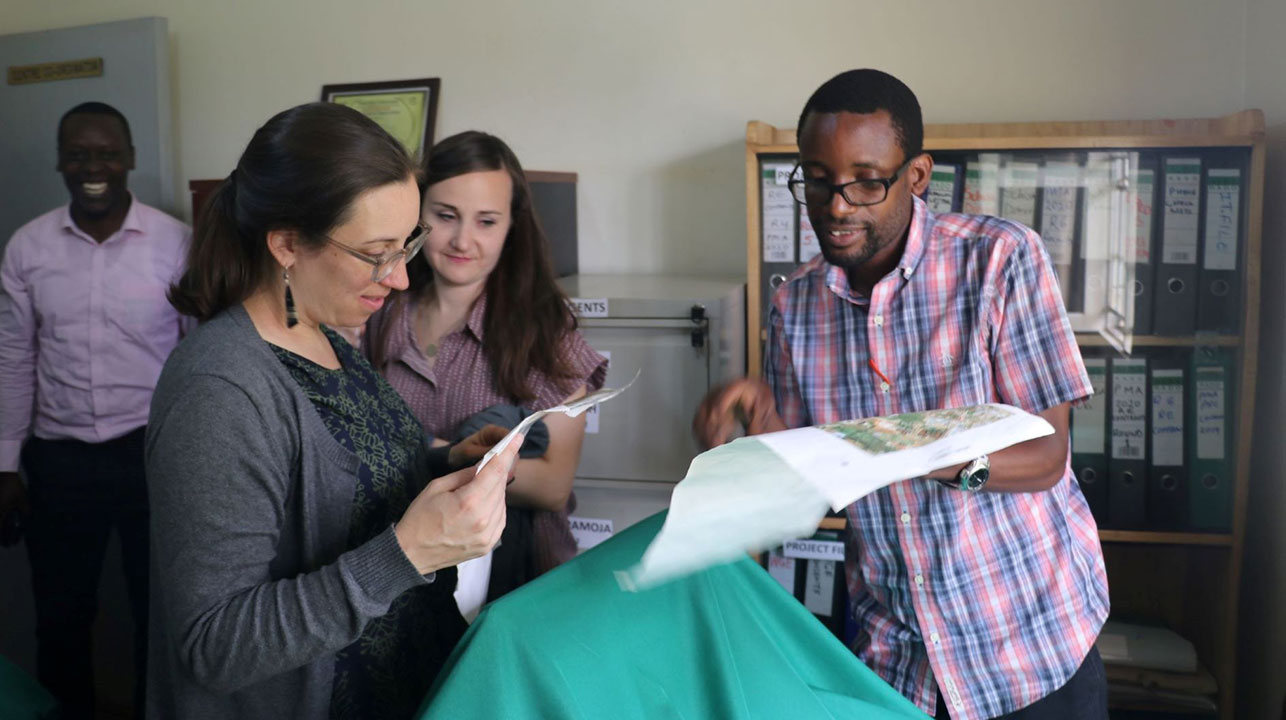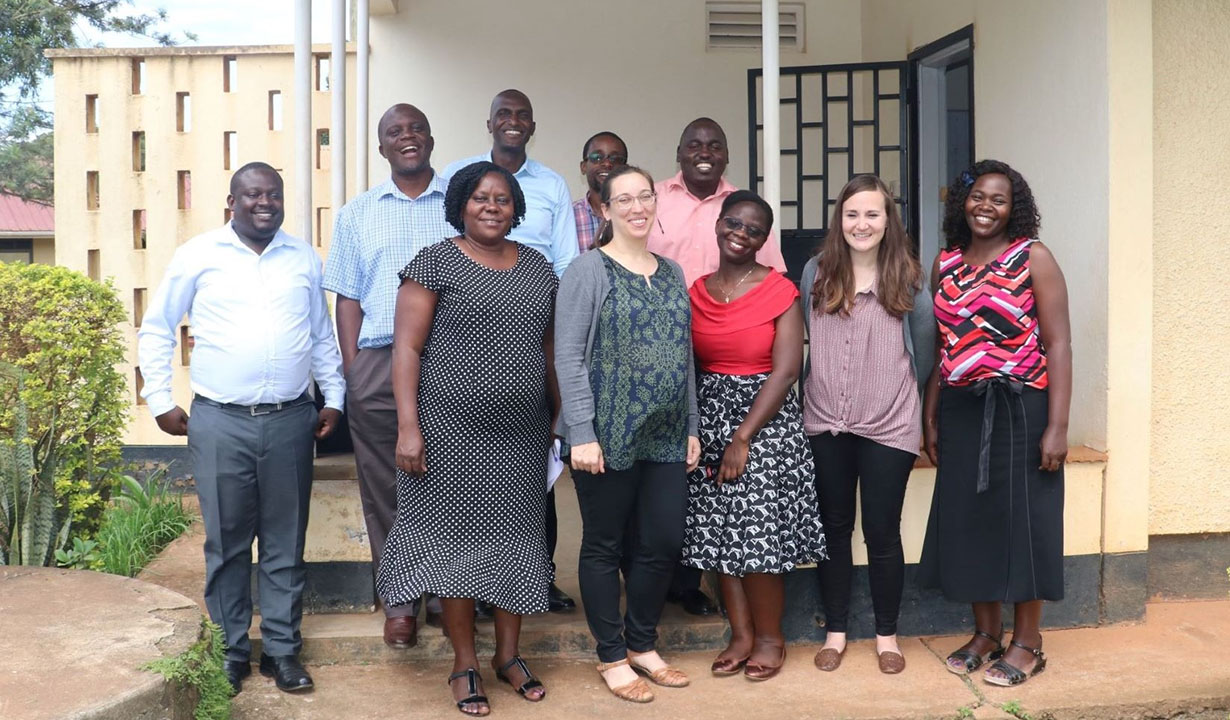
Above: L – R: Prof Rhoda Wanyenze (Dean MakSPH), Dr Simon Peter Kibira (PMA PI), Ms Melissa McVay (BMGF), Dr Jamaica Corker (BMGF)), and Prof Fredrick Makumbi (PMA PI) share a moment in the Dean’s office.
A team from BMGF (Bill and Melinda Gates Foundation) was at MakSPH (Makerere University School of Public Health) on 25th November 2019. Dr Jamaica Corker, Program Officer for Data and Evaluation, and Melissa McVay, Program Assistant, from Foundation offices in Seattle were in Uganda to learn how the Performance Monitoring for Action (PMA) platform conducts the entire research/survey process right from planning, through training, data collection, quality control, relaying, management and analysis to final dissemination.
They started off by paying the Dean of MakSPH, Prof Rhoda Wanyenze, a courtesy call. They were flanked by Dr. Fredrick Edward Makumbi and Dr Simon Peter Kibira the Principal Investigators (PIs) of the project.
The team who were joined by other members from the project office in Uganda proceeded to Mukono district health office, where the chain of data collection commences for the project. The deputy District Health Officer (DHO), Mr Ddumba Isaac who welcomed them to the district thanked them for availing the data from the PMA survey for planning purposes. He informed them that this data, although not district specific is being utilized to make decisions in Mukono. In Mukono, Dr. Fredrick Makumbi, who is also the Deputy Dean of MakSPH echoed the project’s commitment to providing the research data whenever it is needed especially to support programming.
The team then visited Kitega A enumeration area (EA), one of the two EAs in Mukono district, which provides the data for the survey. The Resident Enumerator (RE) in charge of this EA showed the boundaries of this EA to the visiting team and she explained the stages of data collection right from when they start data collection until they send to the PMA offices to clean. She explained that data is sent at the end of each day after the interviews in the field. From the EA site, the team proceeded to the data management centre in Kasangati at the MakSPH annex.
Dr Jamaica Corker was impressed with how data progresses from the field to dissemination, describing the whole process as thorough.
About the PMA Surveys
PMA conducts annual reports on the state of family planning in Uganda. The project conducted six rounds between 2014 and 2018, and two follow up surveys in 2018 and 2019.
Data Collection
Uganda Bureau of Statistics (UBOS) selects the enumeration areas where the surveys are conducted.
The PMA team approaches the leadership (the Chief Administrative Officer – CAO and the District Health Officer – DHO) of the selected districts to obtain approval for the data collection.
District – level supervisors recommend the PMA team to local leaders at village level, who work with resident enumerators (REs) and their supervisors to map the villages and list all households from which the date are obtained. In Mukono, the villages selected are Kitega A – representing the urban population - and Bbanga – representing the rural sample.
Supervisors and the study coordinator take time to randomly sample 44 households (HHs) from each EA. The 44 HHs are then visited individually to obtain their consent to participate in the survey, and all women who are aged 15 to 49 years are contacted for interview.
As data are collected, they are electronically sent to the information centre in Kasangati at the end of each individual interview or day.
The team also collects data about family planning service delivery points (SDPs) concurrently with HH interviews.
Justine Nakasinde, the RE for Kitega A said that the biggest barrier to timely data collection was dealing with a working population who are rarely at home during the working hours. She also decried the high migrations of the urban population as a challenge to follow up surveys, adding that since most of them rent the houses, they are highly mobile..
Agnes Nyiransaba, the RE for Bbanga mentioned the rainy weather and poor telecom network coverage as her biggest barriers, noting that most of the population in her area permanent residents owning their structures with minimal migration. She added that tracking respondents was easy in her EA. Both Ms Nyiransaba and Nakasinde cited the repetitive nature of the surveys (annual data collection) as a wearisome ordeal for the respondents.
Data Handling
Data are received at the information centre by the IT team, who download and hand it over to the data manager, Ms. Vivian Zalwango. She checks the data for consistence and coherence; she basically “cleans” data of errors, before forwarding it to the analysts. If any errors are discovered, the team in the field is notified so that the EA supervisor can verify information from the HH.
The PMA team poses with guests at the just-concluded dissemination in October 2019
Analysis, Interpretation and Dissemination
The panel of analysts includes Ronald Ssenyonga, Mary Nakafeero and the two Principal Investigators (Prof Fredrick Makumbi and Dr Simon Kibira). At this stage, data is transformed from raw data into standardized formats which can be presented to major stakeholders who include notably government.
Finally disseminations at both national and regional regions are held. Major Family planning stakeholders are invited including, but not limited to, the districts where data was collected from, United Nations Population Fund, Makerere University, Members of Parliament, the National Population Council, UBOS and other members of the family planning consortium.
The Performance Monitoring for Action (PMA) project is housed at the School of Public Health at the Kasangati annex. It is supported by the JHPIEGO and the Bill and Melinda Gates Institute for Population and Reproductive Health at the Johns Hopkins University. (www.pmadata.org)




